(ns foundations.computational.linguistics
(:require [reagent.core :as r]
[reagent.dom :as rd]
[clojure.zip :as z]
[clojure.pprint :refer [pprint]]
[clojure.string :refer [index-of]]
;[clojure.string :as str]
))
(enable-console-print!)
(defn log [a-thing]
(.log js/console a-thing))
(defn render-vega [spec elem]
(when spec
(let [spec (clj->js spec)
opts {:renderer "canvas"
:mode "vega"
:actions {
:export true,
:source true,
:compiled true,
:editor true}}]
(-> (js/vegaEmbed elem spec (clj->js opts))
(.then (fn [res]
(. js/vegaTooltip (vega (.-view res) spec))))
(.catch (fn [err]
(log err)))))))
(defn vega
"Reagent component that renders vega"
[spec]
(r/create-class
{:display-name "vega"
:component-did-mount (fn [this]
(render-vega spec (rd/dom-node this)))
:component-will-update (fn [this [_ new-spec]]
(render-vega new-spec (rd/dom-node this)))
:reagent-render (fn [spec]
[:div#vis])}))
;making a histogram from a list of observations
(defn list-to-hist-data-lite [l]
""" takes a list and returns a record
in the right format for vega data,
with each list element the label to a field named 'x'"""
(defrecord rec [category])
{:values (into [] (map ->rec l))})
(defn makehist-lite [data]
{
:$schema "https://vega.github.io/schema/vega-lite/v4.json",
:data data,
:mark "bar",
:encoding {
:x {:field "category",
:type "ordinal"},
:y {:aggregate "count",
:type "quantitative"}
}
})
(defn list-to-hist-data [l]
""" takes a list and returns a record
in the right format for vega data,
with each list element the label to a field named 'x'"""
(defrecord rec [category])
[{:name "raw",
:values (into [] (map ->rec l))}
{:name "aggregated"
:source "raw"
:transform
[{:as ["count"]
:type "aggregate"
:groupby ["category"]}]}
{:name "agg-sorted"
:source "aggregated"
:transform
[{:type "collect"
:sort {:field "category"}}]}
])
(defn makehist [data]
(let [n (count (distinct ((data 0) :values)))
h 200
pad 5
w (if (< n 20) (* n 35) (- 700 (* 2 pad)))]
{
:$schema "https://vega.github.io/schema/vega/v5.json",
:width w,
:height h,
:padding pad,
:data data,
:signals [
{:name "tooltip",
:value {},
:on [{:events "rect:mouseover", :update "datum"},
{:events "rect:mouseout", :update "{}"}]}
],
:scales [
{:name "xscale",
:type "band",
:domain {:data "agg-sorted", :field "category"},
:range "width",
:padding 0.05,
:round true},
{:name "yscale",
:domain {:data "agg-sorted", :field "count"},
:nice true,
:range "height"}
],
:axes [
{ :orient "bottom", :scale "xscale" },
{ :orient "left", :scale "yscale" }
],
:marks [
{:type "rect",
:from {:data "agg-sorted"},
:encode {
:enter {
:x {:scale "xscale", :field "category"},
:width {:scale "xscale", :band 1},
:y {:scale "yscale", :field "count"},
:y2 {:scale "yscale", :value 0}
},
:update {:fill {:value "steelblue"}},
:hover {:fill {:value "green"}}
}
},
{:type "text",
:encode {
:enter {
:align {:value "center"},
:baseline {:value "bottom"},
:fill {:value "#333"}
},
:update {
:x {:scale "xscale", :signal "tooltip.category", :band 0.5},
:y {:scale "yscale", :signal "tooltip.count", :offset -2},
:text {:signal "tooltip.count"},
:fillOpacity [
{:test "isNaN(tooltip.count)", :value 0},
{:value 1}
]
}
}
}
]
}))
(defn hist [l]
(-> l
list-to-hist-data
makehist
vega))
; for making bar plots
(defn list-to-barplot-data-lite [l m]
""" takes a list and returns a record
in the right format for vega data,
with each list element the label to a field named 'x'"""
(defrecord rec [category amount])
{:values (into [] (map ->rec l m))})
(defn makebarplot-lite [data]
{
:$schema "https://vega.github.io/schema/vega-lite/v4.json",
:data data,
:mark "bar",
:encoding {
:x {:field "element", :type "ordinal"},
:y {:field "value", :type "quantitative"}
}
})
(defn list-to-barplot-data [l m]
""" takes a list and returns a record
in the right format for vega data,
with each list element the label to a field named 'x'"""
(defrecord rec [category amount])
{:name "table",
:values (into [] (map ->rec l m))})
(defn makebarplot [data]
(let [n (count (data :values))
h 200
pad 5
w (if (< n 20) (* n 35) (- 700 (* 2 pad)))]
{
:$schema "https://vega.github.io/schema/vega/v5.json",
:width w,
:height h,
:padding pad,
:data data,
:signals [
{:name "tooltip",
:value {},
:on [{:events "rect:mouseover", :update "datum"},
{:events "rect:mouseout", :update "{}"}]}
],
:scales [
{:name "xscale",
:type "band",
:domain {:data "table", :field "category"},
:range "width",
:padding 0.05,
:round true},
{:name "yscale",
:domain {:data "table", :field "amount"},
:nice true,
:range "height"}
],
:axes [
{ :orient "bottom", :scale "xscale" },
{ :orient "left", :scale "yscale" }
],
:marks [
{:type "rect",
:from {:data "table"},
:encode {
:enter {
:x {:scale "xscale", :field "category"},
:width {:scale "xscale", :band 1},
:y {:scale "yscale", :field "amount"},
:y2 {:scale "yscale", :value 0}
},
:update {:fill {:value "steelblue"}},
:hover {:fill {:value "green"}}
}
},
{:type "text",
:encode {
:enter {
:align {:value "center"},
:baseline {:value "bottom"},
:fill {:value "#333"}
},
:update {
:x {:scale "xscale", :signal "tooltip.category", :band 0.5},
:y {:scale "yscale", :signal "tooltip.amount", :offset -2},
:text {:signal "tooltip.amount"},
:fillOpacity [
{:test "isNaN(tooltip.amount)", :value 0},
{:value 1}
]
}
}
}
]
}))
(defn barplot [l m]
(vega (makebarplot (list-to-barplot-data l m))))
; now, for tree making
;(thanks to Taylor Wood's answer in this thread on stackoverflow:
; https://stackoverflow.com/questions/57911965)
(defn count-up-to-right [loc]
(if (z/up loc)
(loop [x loc, pops 0]
(if (z/right x)
pops
(recur (z/up x) (inc pops))))
0))
(defn list-to-tree-spec [l]
""" takes a list and walks through it (with clojure.zip library)
and builds the record format for the spec needed to for vega"""
(loop [loc (z/seq-zip l), next-id 0, parent-ids [], acc []]
(cond
(z/end? loc) acc
(z/end? (z/next loc))
(conj acc
{:id (str next-id)
:name (str (z/node loc))
:parent (when (seq parent-ids)
(str (peek parent-ids)))})
(and (z/node loc) (not (z/branch? loc)))
(recur
(z/next loc)
(inc next-id)
(cond
(not (z/right loc))
(let [n (count-up-to-right loc)
popn (apply comp (repeat n pop))]
(some-> parent-ids not-empty popn))
(not (z/left loc))
(conj parent-ids next-id)
:else parent-ids)
(conj acc
{:id (str next-id)
:name (str (z/node loc))
:parent (when (seq parent-ids)
(str (peek parent-ids)))}))
:else
(recur (z/next loc) next-id parent-ids acc))))
(defn maketree [w h tree-spec]
""" makes vega spec for a tree given tree-spec in the right json-like format """
{:$schema "https://vega.github.io/schema/vega/v5.json"
:data [{:name "tree"
:transform [{:key "id" :parentKey "parent" :type "stratify"}
{:as ["x" "y" "depth" "children"]
:method {:signal "layout"}
:size [{:signal "width"} {:signal "height"}]
:type "tree"}]
:values tree-spec
}
{:name "links"
:source "tree"
:transform [{:type "treelinks"}
{:orient "horizontal"
:shape {:signal "links"}
:type "linkpath"}]}]
:height h
:marks [{:encode {:update {:path {:field "path"} :stroke {:value "#ccc"}}}
:from {:data "links"}
:type "path"}
{:encode {:enter {:size {:value 50} :stroke {:value "#fff"}}
:update {:fill {:field "depth" :scale "color"}
:x {:field "x"}
:y {:field "y"}}}
:from {:data "tree"}
:type "symbol"}
{:encode {:enter {:baseline {:value "bottom"}
:font {:value "Courier"}
:fontSize {:value 14}
:angle {:value 0}
:text {:field "name"}}
:update {:align {:signal "datum.children ? 'center' : 'center'"}
:dy {:signal "datum.children ? -6 : -6"}
:opacity {:signal "labels ? 1 : 0"}
:x {:field "x"}
:y {:field "y"}}}
:from {:data "tree"}
:type "text"}]
:padding 5
:scales [{:domain {:data "tree" :field "depth"}
:name "color"
:range {:scheme "magma"}
:type "linear"
:zero true}]
:signals [{:bind {:input "checkbox"} :name "labels" :value true}
{:bind {:input "radio" :options ["tidy" "cluster"]}
:name "layout"
:value "tidy"}
{:name "links"
:value "line"}]
:width w}
)
(defn tree-depth
"get the depth of a tree (list)"
[list]
(if (seq? list)
(inc (apply max 0 (map tree-depth list)))
0))
(defn tree
"plot tree using vega"
[list]
(let [spec (list-to-tree-spec list)
h (* 30 (tree-depth list))]
(vega (maketree 700 h spec))))
(defn logsumexp [& log-vals]
(let [mx (apply max log-vals)]
(+ mx
(Math/log2
(apply +
(map (fn [z] (Math/pow 2 z))
(map (fn [x] (- x mx))
log-vals)))))))
(defn flip [p]
(if (< (rand 1) p)
true
false))
(defn score-categorical [outcome outcomes params]
(if (empty? params)
(throw "no matching outcome")
(if (= outcome (first outcomes))
(Math/log2 (first params))
(score-categorical outcome (rest outcomes) (rest params)))))
(defn list-unfold [generator len]
(if (= len 0)
'()
(cons (generator)
(list-unfold generator (- len 1)))))
(defn sample-gamma [shape scale]
(apply + (repeatedly
shape (fn []
(- (Math/log2 (rand))))
)))
(defn sample-dirichlet [pseudos]
(let [gammas (map (fn [sh]
(sample-gamma sh 1))
pseudos)]
(normalize gammas)))
(defn normalize [dist]
(let [sum (apply + (map prob dist))]
(map
(fn [x]
[(value x) (/ (prob x) sum)] )
dist)))
(defn sample-categorical [dist]
(if (flip (prob (first dist)))
(value (first dist))
(sample-categorical
(normalize (rest dist)))))
In this chapter, we present a very general way of formulating of
parsing algorithms, known as the parsing as deduction approach. For
context-free grammars, the parsing problem always involves a search
over the possible derviation trees for a particular string, given a
grammar. Under the parsing as deduction approach, we separate the
order of this search, from it’s logical characteristics. We do
this by viewing parsing as a kind of logical deduction, starting from
some axioms and proceeding to prove a theorem, called a goal. A
parsing as deduction specification of a parsing algorithm has three components:
-
A specification of the format of items. These items indicate
statements about the space of possible derivations that have been
proven by the system so far.
-
A specification of a set of axioms. These axioms represent the
starting statements that do not need to be proved.
-
A specification of a set of goals. These represent the statements
about the set of derivations that we are trying to prove.
-
A specification of a set of inference rules which provide rules
on how to go from already proven items to new items.
These components are best illustrated by example. Below we give an
overview of four popular algorithms. Throughout these examples, we
will use the following grammar.
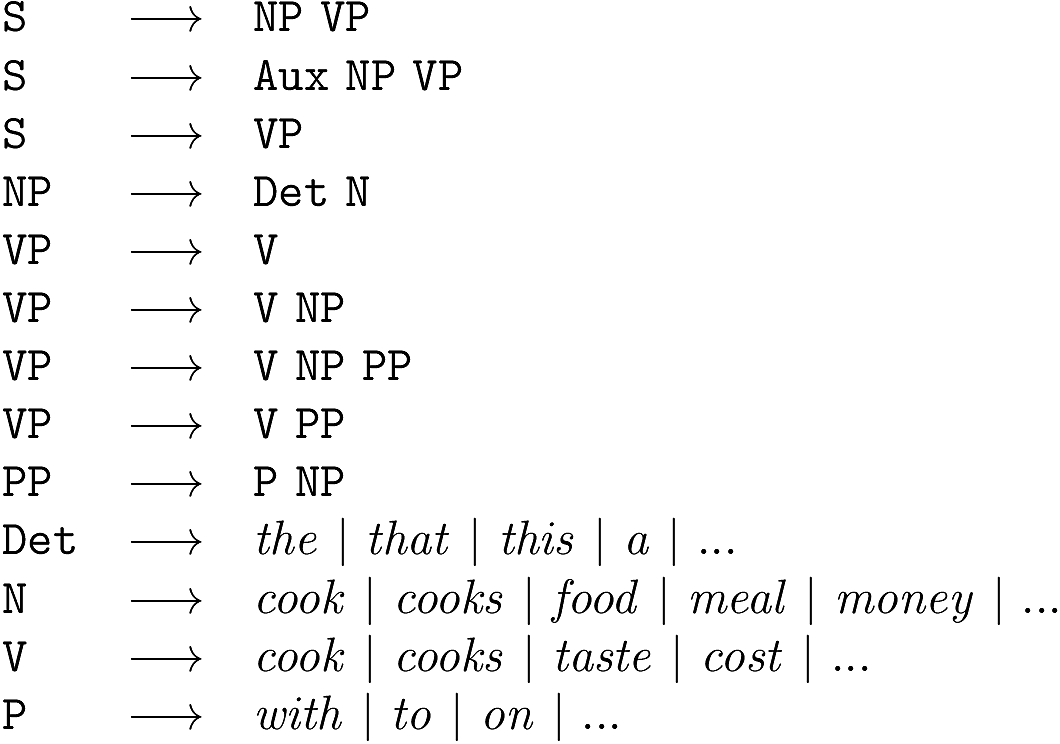
And the following sentence and valid derivation tree under this grammar.
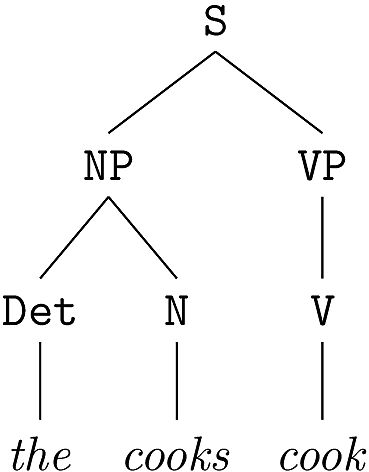
Recursive Descent Parsing
Our first algorith, is known as recursive decent parsing and is a
simplest top-down, depth first algorithm for parsing CFGs.
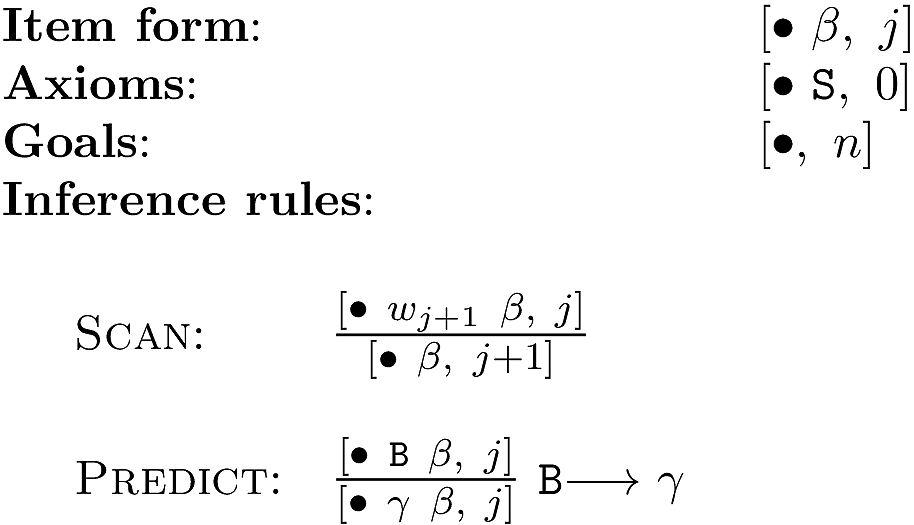
Here is an example of a set of deductions that lead to a valid parse
of the example sentence above.
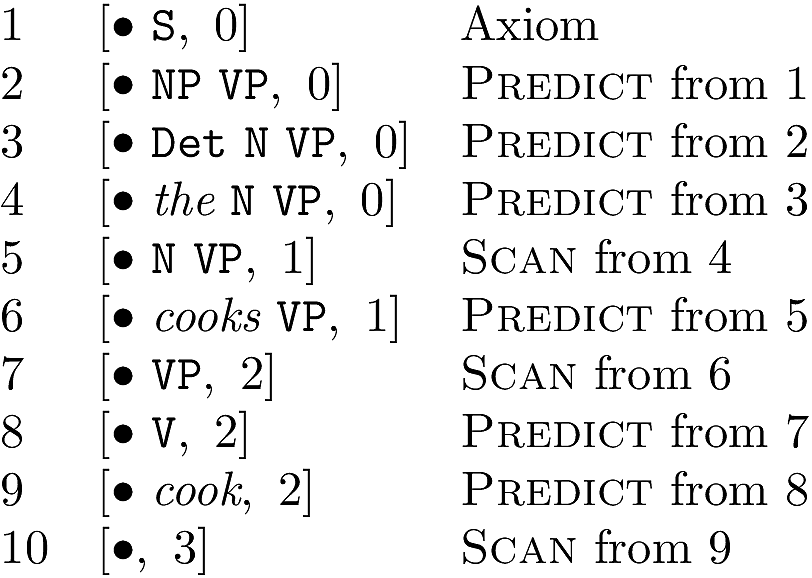
Shift Reduce Parsing
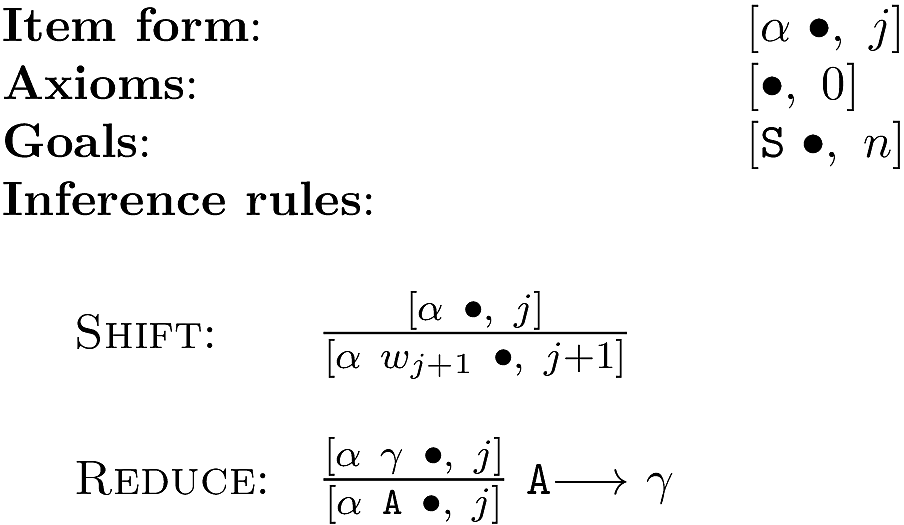
Here is an example of a set of deductions that lead to a valid parse
of the example sentence above.
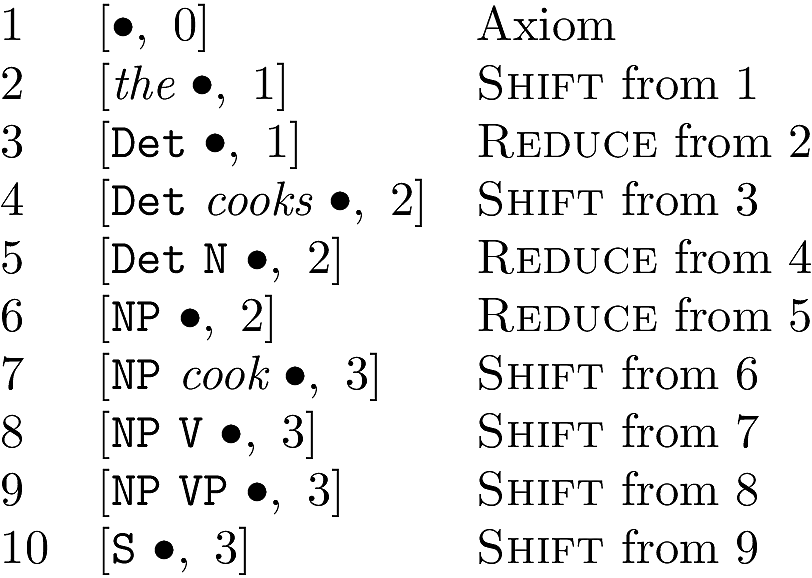
Earley Parsing
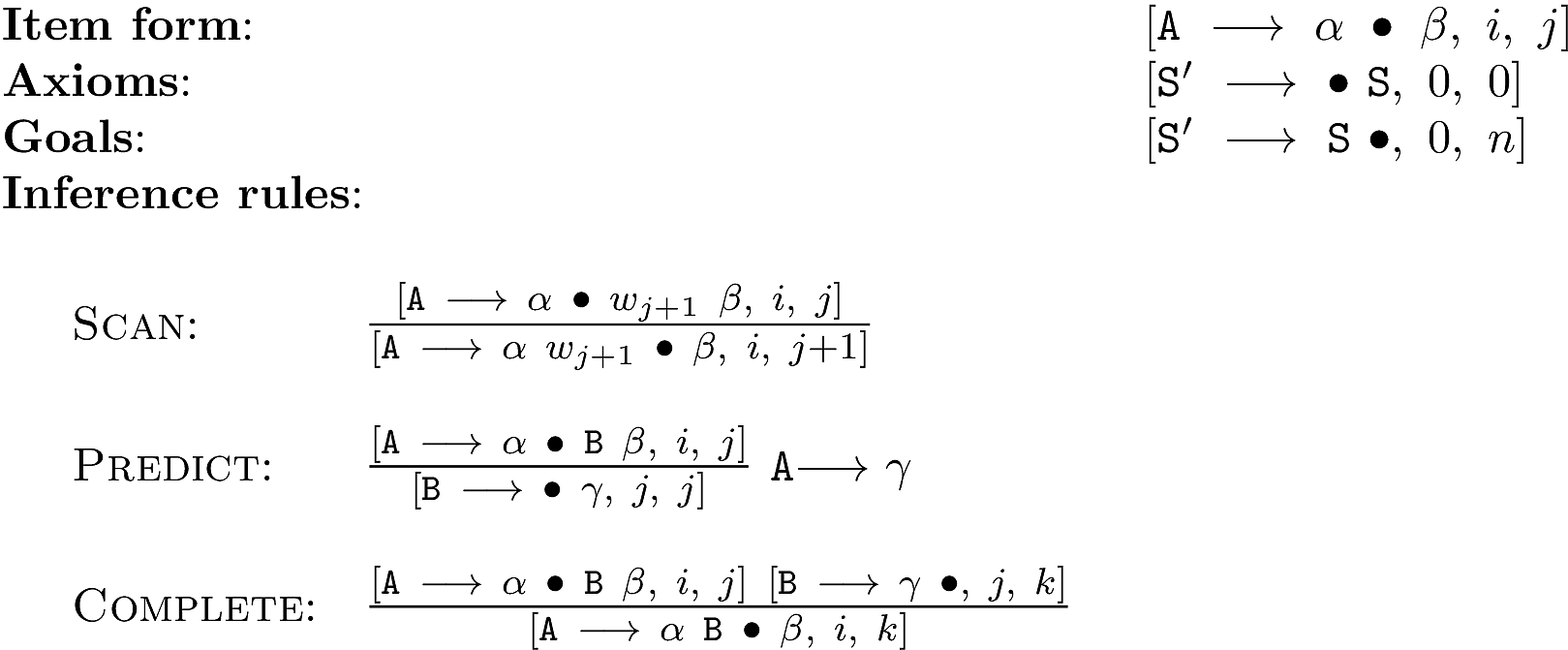
Here is an example of a set of deductions that lead to a valid parse
of the example sentence above.
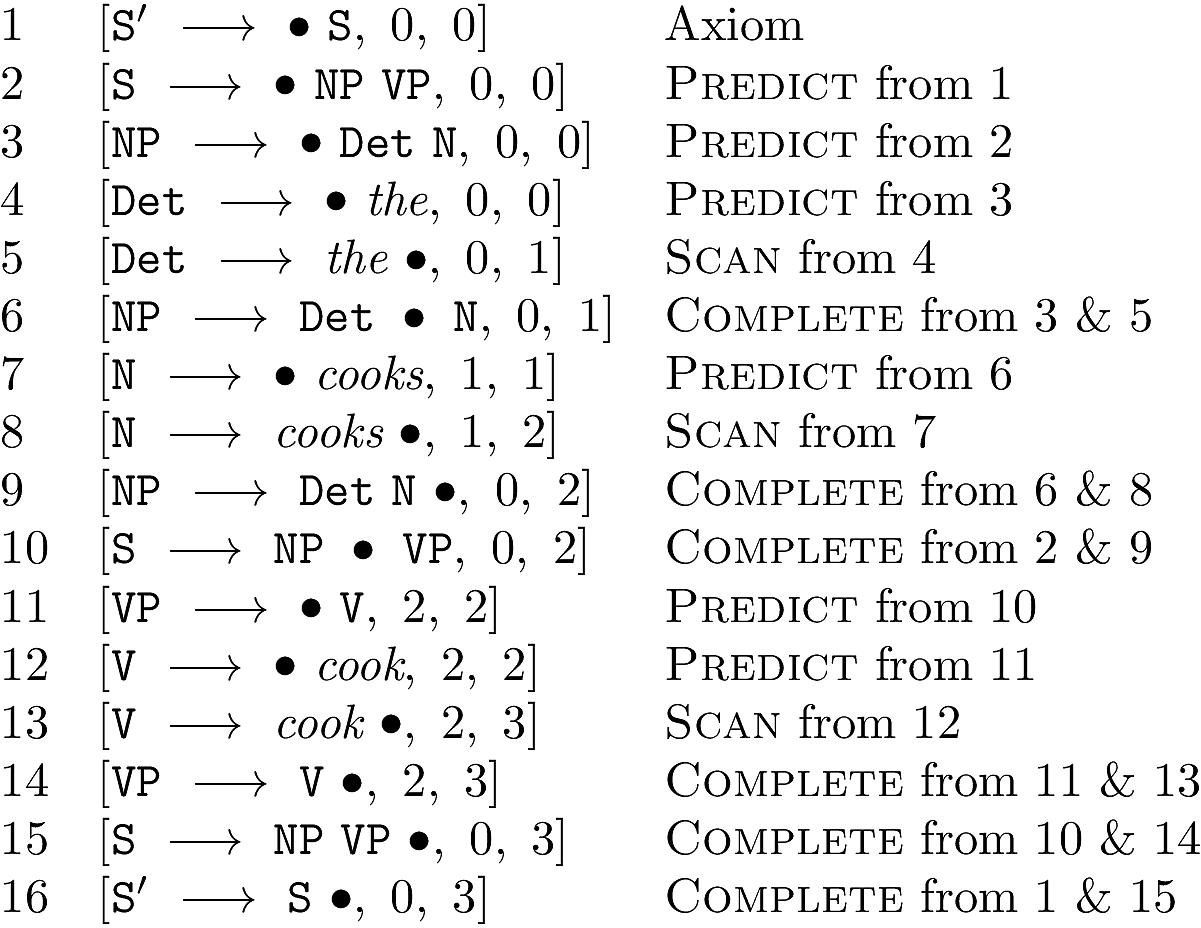
← 43 Parsing Context-Free Grammars
45 Chomsky Normal Form and CYK Parsing →







